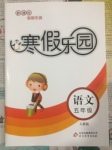题目内容
.A big earthquake________ Pakistan on October 8 , 2005, ________ over 70,000 people.
| A.strikes; killing | B.struck; killing | C.knocked; killed | D.hit; kills |
B
解析

 寒假乐园北京教育出版社系列答案
寒假乐园北京教育出版社系列答案Henry found work in a bookstore after he finished middle school. He wouldn’t do anything but wanted to get rich. Mr. King thought he was too lazy and was going to send him away. Henry was afraid and had to work hard.
It was a cold morning. It was snowing and there was thin ice on the streets. Few people went to buy the books and the young man had nothing to do. He hated to read, so he watched the traffic. Suddenly he saw a bag fall off a truck and it landed by the other side of the street.
“It must be full of expensive things,” Henry said to himself. “I have to get it, or others will take it away. ”
He went out of the shop and ran across the street. A driver saw him and began to whistle (鸣笛), but he didn’t hear it and went on running. The man drove aside, hit a big tree and was hurt in the accident. Two weeks later Henry was taken to court (法庭). A judge asked if he heard the whistle when he was running across the street. He said that something was wrong with his ears and he could hear nothing.
“But you’ve heard me this time.” said the judge.
“Oh, I’m sorry. Now I can hear with one ear.”
“Cover the ear with your hand and listen to me with your deaf (聋的)one. Well, can you hear me? ”
“No, I can’t, Sir.”
【小题1】What was Mr. King?
| A.a driver | B.a doctor |
| C.a policeman | D.a shopkeeper |
| A.Because Henry was too lazy. |
| B.Because Henry hoped to be rich. |
| C.Because Henry finished middle school. |
| D.Because Henry sold few books. |
| A.He drove aside and hit a big tree. |
| B.He began to whistle to him. |
| C.He went out of the bookstore. |
| D.He shouted at him. |
| A.He wanted to have a joke with the judge. |
| B.He wanted to get the judge’s help |
| C.He wanted to find another piece of work |
| D.He didn’t want to pay for the accident. |